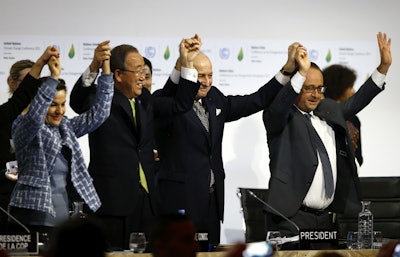
Secretary-General Ban Ki-moon said Monday he is inviting world leaders to the United Nations on April 22 — Earth Day — to sign the landmark agreement to tackle climate change that was reached in Paris.
Ban told reporters he wants leaders of the nearly 200 countries that approved the deal on Saturday to come to U.N. headquarters on the day it opens for signature "because this will be the first-ever universal climate change agreement."
He said the United Nations is also organizing an "action summit" on May 5-6 for governments, business and civil society to focus on implementing the deal.
Ban has made climate change a top priority from the day he became secretary-general nearly nine years ago. He tried to rally support for an agreement with every leader he met, warning that global warming was threatening the planet. He spent much of the last two weeks in Paris and was exuberant when he talked to reporters after returning to New York.
The countries of the world have made "a historic choice" in deciding to work together to address "the defining challenge of our times," Ban said.
He called it the most significant action in years to uphold the U.N. Charter's mandate to "save succeeding generations."
 (AP Photo)
(AP Photo)The agreement is the first to ask all countries to join the fight against global warming and represents a major change in U.N. action that previously required only wealthy nations to reduce their greenhouse gas emissions. Its aim is to keep global temperatures from rising another degree Celsius (1.8 Fahrenheit) between now and 2100, a key demand of poor countries ravaged by rising sea levels and other effects of climate change.
"The Paris Agreement sends a clear signal that the transformation of the global economy to low-emission, climate-resilient growth is inevitable, beneficial and already under way," Ban said. "It will save lives, improve human well-being and promote more peaceful, stable societies."
Janos Pasztor, the assistant secretary-general on climate change, said the plans submitted by 188 countries to address climate change represent "a firm floor" for future action, noting that all countries are required to submit updated plans every five year which must be "no less ambitious."
After countries sign the agreement, at least 55 countries representing at least 55 percent of global emissions must ratify it before it can take effect. Pasztor said the goal is to have the agreement take effect in 2020.






















